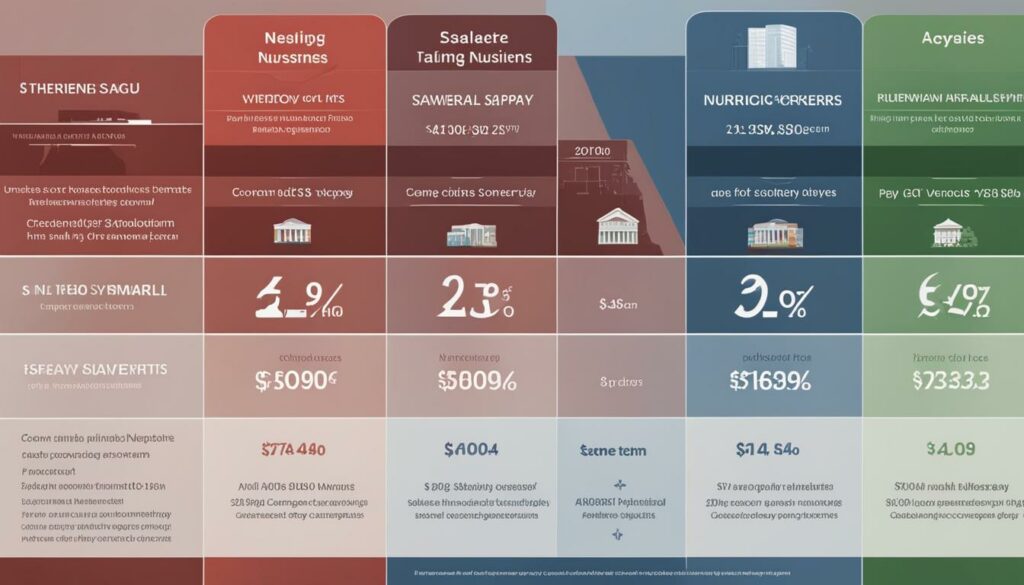Are you a travel nurse looking to take your career to the next level? Advanced degrees for travel nurses will get you there. Consider pursuing advanced degrees for travel nurses to unlock new opportunities for career advancement and higher earning potential. With the right education, you can broaden your skillset, specialize in a specific area of healthcare, and stand out among your peers in the travel nursing field.
Travel nursing education has evolved to meet the needs of professionals like you, offering online advanced degree programs that provide flexibility and convenience. Whether you’re interested in obtaining a bachelor’s degree or pursuing higher education options, there are accredited programs available that cater specifically to travel nurses.
Continuing education is essential for professional development in any nursing career, and travel nursing is no exception. By investing in your ongoing education and staying up-to-date with industry advancements, you can enhance your knowledge, skills, and qualifications, making you a valuable asset to healthcare facilities across the globe.
Key Takeaways:
- Advanced degrees for travel nurses can open doors to more job opportunities and higher salaries for travel nurses.
- Online advanced degree programs offer flexibility for travel nurses to balance their education with their career.
- Continuing education is crucial for professional development and staying competitive in the travel nursing field.
- Accredited programs provide travel nurses with the assurance of quality education and recognized credentials.
- Investing in advanced degrees for travel nurses and professional development can lead to rewarding and impactful careers as a travel nurse.
Education Requirements for Travel Nurses
Becoming a travel nurse requires meeting specific educational requirements that equip individuals with the necessary skills and knowledge to thrive in the profession. Travel nurses predominantly pursue degrees in nursing, nursing science, or business to lay a solid foundation for their careers. The most common degrees held by travel nurses are a bachelor’s degree or an associate degree, which provide comprehensive training in healthcare practices and prepare individuals for diverse nursing roles.
Online courses offer flexibility and convenience for travel nurses seeking to fulfill their educational requirements. These courses enable nurses to enhance their knowledge and skills while accommodating their travel schedules. Online education programs specifically tailored for travel nurses are readily available, covering a range of essential topics and specialties.
Furthermore, travel nurses can boost their qualifications by obtaining certifications that demonstrate their expertise and dedication to providing high-quality patient care. Certifications such as Basic Life Support for Healthcare and Public Safety (BLS) and Trauma Nursing Core Course (TNCC) are highly valued in the travel nursing field, as they validate a nurse’s competency in critical care and emergency situations.
Benefits of Advanced Education for Travel Nurses
The pursuit of advanced education in nursing offers numerous advantages for travel nurses. By obtaining higher degrees such as a Master of Science in Nursing (MSN) or a Doctor of Nursing Practice (DNP), travel nurses can unlock opportunities for career advancement, increased earning potential, and specialized roles.
Advanced degrees for travel nurses enable travel nurses to specialize in areas such as nurse anesthesia, psychiatric mental health, midwifery, family practice, clinical nursing, informatics, education, research, and more. These specialized roles often come with higher salaries and provide travel nurses with the chance to make a meaningful impact in their chosen field.
Continuing education and professional development are integral to success in the travel nursing profession. By staying up-to-date with the latest advancements in healthcare and pursuing advanced degrees and certifications, travel nurses can continually expand their knowledge base, enhance their skills, and provide exceptional care to patients across multiple settings.
| Education Path | Impact on Career |
|---|---|
| Bachelor’s degree in nursing | Provides essential knowledge and skills for entry-level travel nursing positions. |
| Associate degree in nursing | Offers a solid foundation for a career in travel nursing with a shorter duration of study. |
| Online courses | Allows travel nurses to balance work and education, gaining additional expertise in specific areas. |
| Certifications | Enhances qualifications and demonstrates competency in specialized areas such as critical care. |
Best Majors for Travel Nurses
The field of travel nursing offers exciting opportunities for nurses to explore new places, gain diverse experiences, and make a positive impact on patient care. If you’re considering a career as a travel nurse, choosing the right major can greatly enhance your prospects and open doors to a wide range of job opportunities.
The best majors for travel nurses provide a solid foundation in their field and equip them with the necessary skills and knowledge to excel in their careers.
1. International Relations
An international relations major can be an excellent choice for travel nurses who wish to work in a global healthcare setting. This major equips nurses with a deep understanding of political, cultural, and economic factors that influence healthcare systems worldwide. It also enhances cross-cultural communication skills, which are essential for providing quality care to diverse populations.
2. Education
Obtaining a degree in education can be beneficial for travel nurses who are passionate about teaching and mentoring other healthcare professionals. This major provides a solid foundation in instructional design, curriculum development, and educational leadership, enabling travel nurses to pursue roles as clinical instructors or nurse educators.
3. Business
A business major can open up diverse career opportunities for travel nurses, including healthcare administration, consulting, and leadership roles. This major provides essential knowledge in areas such as management, finance, and strategic planning, which are valuable skills in today’s healthcare industry.
4. Journalism
A journalism major can be advantageous for travel nurses who are interested in healthcare reporting, medical writing, or healthcare marketing. This major enhances communication skills, critical thinking, and storytelling abilities, enabling travel nurses to effectively communicate health information to the public through various media channels.
5. Marketing
In today’s digital age, marketing plays a crucial role in healthcare. A major in marketing equips travel nurses with skills in branding, advertising, market research, and digital marketing strategies. This knowledge can be beneficial for travel nurses working in healthcare organizations or pursuing entrepreneurial ventures.
6. Web Design and Development
A major in web design and development can be a valuable asset for travel nurses interested in pursuing freelance work or developing their own healthcare websites or blogs. This major equips nurses with the technical skills to design user-friendly websites, create engaging content, and optimize online platforms for improved user experience.
7. Linguistics
A linguistics major can enhance a travel nurse’s ability to communicate effectively with patients from diverse cultural and linguistic backgrounds. This major provides a deep understanding of language structure, sociolinguistics, and intercultural communication, enabling travel nurses to provide culturally sensitive care and overcome language barriers.
8. Nursing Specialization
For travel nurses who want to specialize in a specific area of nursing, pursuing a major in that specialization can provide a deep understanding of the subject matter and advanced clinical skills. Some popular nursing specializations for travel nurses include critical care, emergency nursing, pediatric nursing, and oncology nursing, among others.
| Majors | Skills and Benefits |
|---|---|
| International Relations | Global healthcare understanding, cross-cultural communication skills |
| Education | Instructional design, curriculum development, teaching opportunities |
| Business | Management, finance, strategic planning, leadership roles |
| Journalism | Communication skills, critical thinking, healthcare reporting |
| Marketing | Branding, advertising, market research |
| Web Design and Development | Website design, content creation, digital marketing |
| Linguistics | Language structure, intercultural communication, cultural sensitivity |
| Nursing Specialization | Advanced clinical skills, specialized knowledge |
Choosing the right major is a personal decision that should align with your interests, skills, and career goals. Consider exploring these majors and speaking with academic advisors or professionals in the field to determine which path is best suited for your aspirations as a travel nurse.
Top Degrees for Travel Nurses
For travel nurses looking to advance their careers and explore new opportunities, obtaining a specialized degree is a smart choice. The following are some of the top degrees for travel nurses:
- Nurse Anesthetist
- Psychiatric Mental Health Nurse Practitioner
- Nurse Midwife
- Family Nurse Practitioner
- Clinical Nurse Specialist
- Informatics Nurse
- Nurse Educator
- Nurse Researcher
- Oncology Nurse
- Travel Nurse
- Trauma Nurse
- Dialysis Nurse
- Infection Control/Prevention Nurse
- Neonatal Nurse
- Acute Care Nurse
- Geriatric Nurse
- Nurse Advocate
- Public Health Nurse
- Pediatric Nurse
- School Nurse
These degrees offer specialized knowledge and skills in specific areas of healthcare, allowing travel nurses to provide expert care and excel in their chosen specialties. These highly sought-after degrees also offer travel nurses the opportunity to earn higher wages and stand out in the job market.
Here is a comparison table showcasing the average salaries for some of these top degrees in the nursing field:
Nursing Specialties Salary Comparison
| Nursing Specialty | Average Salary |
|---|---|
| Nurse Anesthetist | $181,040 |
| Psychiatric Mental Health Nurse Practitioner | $115,800 |
| Nurse Midwife | $105,030 |
| Family Nurse Practitioner | $111,840 |
| Clinical Nurse Specialist | $116,465 |
| Informatics Nurse | $90,583 |
| Nurse Educator | $83,160 |
| Nurse Researcher | $97,902 |
| Oncology Nurse | $83,040 |
| Travel Nurse | $74,040 |
| Trauma Nurse | $75,030 |
| Dialysis Nurse | $75,030 |
| Infection Control/Prevention Nurse | $84,794 |
| Neonatal Nurse | $78,972 |
| Acute Care Nurse | $96,237 |
| Geriatric Nurse | $79,660 |
| Nurse Advocate | $97,987 |
| Public Health Nurse | $63,263 |
| Pediatric Nurse | $71,730 |
| School Nurse | $50,144 |
These salaries may vary depending on factors such as location, experience, and level of education. However, it’s clear that specializing in one of these top degrees can lead to rewarding career opportunities and financial stability for travel nurses.
Salary Comparison for Nursing Specialties
Nursing specialties offer varying salaries based on the level of expertise and specialization. Among the highest-paying nursing specialties are:
- Nurse Anesthetist: Nurse anesthetists have an average annual salary of $181,040.
- Psychiatric Mental Health Nurse Practitioner: Psychiatric mental health nurse practitioners earn an average annual salary of $117,670.
- Nurse Midwife: With an average annual salary of $111,130, nurse midwives also enjoy high salaries.
Other nursing specialties with competitive salaries include:
- Family Nurse Practitioner
- Clinical Nurse Specialist
- Informatics Nurse
- Nurse Educator
- Nurse Researcher
- Oncology Nurse
- Travel Nurse
- Trauma Nurse
- Dialysis Nurse
- Infection Control/Prevention Nurse
- Neonatal Nurse
- Acute Care Nurse
- Geriatric Nurse
- Nurse Advocate
- Public Health Nurse
- Pediatric Nurse
- School Nurse

Advanced Degrees for Travel Nurses Recap
Advanced degrees for travel nurses offer significant advantages for travel nurses, including higher salaries and access to specialized roles. By pursuing advanced degrees for travel nurses, travel nurses can expand their knowledge base and enhance their skills, positioning themselves for career growth and increased earning potential.
Additionally, the wide range of majors and specialties available in the nursing field allows travel nurses to align their education with their passions and interests. Whether they choose to focus on international relations, education, business, journalism, marketing, or any other field, travel nurses can tailor their educational path to suit their individual goals.
Continuous professional development is vital for success in the travel nursing profession. By staying up-to-date with industry certifications and advancements, travel nurses can provide the highest quality patient care and make a positive impact on healthcare outcomes.
In conclusion, travel nurses can greatly benefit from pursuing advanced degrees for travel nurses and maintaining ongoing professional development. These investments in education and skills development enable travel nurses to excel in their careers, experience job satisfaction, and contribute to enhanced patient care.
Learn Morea About Travel Nurse Education
What are some advanced degrees for travel nurses that travel nurses can pursue?
Travel nurses can pursue advanced degrees for travel nurses such as a master’s degree in nursing or healthcare administration, a Doctor of Nursing Practice (DNP) degree, or a specialized certificate program in a nursing specialty.
How can an advanced degree for travel nurses benefit a travel nurse’s career?
An advanced degree for travel nurses can provide travel nurses with better earning potential, access to higher-level job opportunities, and increased job security. It can also help them specialize in specific areas of healthcare and take on leadership roles.
What are some online programs that offer advanced degrees for travel nurses?
Some reputable institutions that offer online advanced degree for travel nurses are programs for travel nurses include the University of Phoenix, Grand Canyon University, and Excelsior College.
What are the education requirements for becoming a travel nurse?
Most travel nurses have at least a bachelor’s degree in nursing, nursing science, or a related field. Some travel nurses may also have an associate degree in nursing.
Are there online courses available for travel nurses to meet the educational requirements?
Yes, there are online courses and programs available for travel nurses to obtain the necessary education. These online options provide flexibility and convenience for nurses who are already working or have other commitments.
Are there any certifications that can enhance a travel nurse’s qualifications?
Yes, certifications such as Basic Life Support for Healthcare and Public Safety (BLS) and Trauma Nursing Core Course (TNCC) can enhance a travel nurse’s skills and qualifications.
What are the best majors for travel nurses?
Some of the top majors for travel nurses include international relations, education, business, journalism, marketing, web design and development, linguistics, and nursing specializations.
What are some of the top degrees for travel nurses?
The top degrees for travel nurses include nurse anesthetist, psychiatric mental health nurse practitioner, nurse midwife, family nurse practitioner, clinical nurse specialist, informatics nurse, nurse educator, nurse researcher, oncology nurse, travel nurse, trauma nurse, dialysis nurse, infection control/prevention nurse, neonatal nurse, acute care nurse, geriatric nurse, nurse advocate, public health nurse, pediatric nurse, and school nurse.
Which nursing specialties have the highest salaries?
Nurse anesthetists, psychiatric mental health nurse practitioners, and nurse midwives tend to have some of the highest salaries among nursing specialties. Other high-paying specialties include family nurse practitioners, clinical nurse specialists, informatics nurses, nurse educators, nurse researchers, oncology nurses, travel nurses, trauma nurses, dialysis nurses, infection control/prevention nurses, neonatal nurses, acute care nurses, geriatric nurses, nurse advocates, public health nurses, pediatric nurses, and school nurses.




